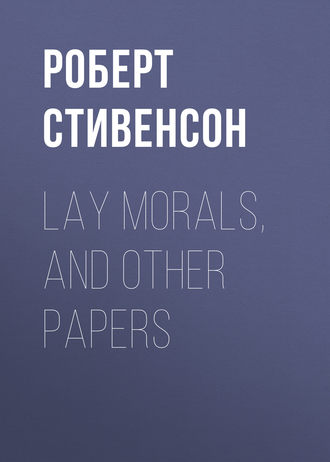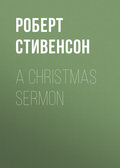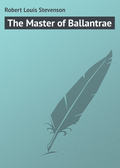
Роберт Льюис Стивенсон
Lay Morals, and Other Papers
One such sequence is the fight of Christian and Apollyon – six cuts, weird and fiery, like the text. The pilgrim is throughout a pale and stockish figure; but the devil covers a multitude of defects. There is no better devil of the conventional order than our artist’s Apollyon, with his mane, his wings, his bestial legs, his changing and terrifying expression, his infernal energy to slay. In cut the first you see him afar off, still obscure in form, but already formidable in suggestion. Cut the second, ‘The Fiend in Discourse,’ represents him, not reasoning, railing rather, shaking his spear at the pilgrim, his shoulder advanced, his tail writhing in the air, his foot ready for a spring, while Christian stands back a little, timidly defensive. The third illustrates these magnificent words: ‘Then Apollyon straddled quite over the whole breadth of the way, and said, I am void of fear in this matter: prepare thyself to die; for I swear by my infernal den that thou shalt go no farther: here will I spill thy soul! And with that he threw a flaming dart at his breast.’ In the cut he throws a dart with either hand, belching pointed flames out of his mouth, spreading his broad vans, and straddling the while across the path, as only a fiend can straddle who has just sworn by his infernal den. The defence will not be long against such vice, such flames, such red-hot nether energy. And in the fourth cut, to be sure, he has leaped bodily upon his victim, sped by foot and pinion, and roaring as he leaps. The fifth shows the climacteric of the battle; Christian has reached nimbly out and got his sword, and dealt that deadly home-thrust, the fiend still stretched upon him, but ‘giving back, as one that had received his mortal wound.’ The raised head, the bellowing mouth, the paw clapped upon the sword, the one wing relaxed in agony, all realise vividly these words of the text. In the sixth and last, the trivial armed figure of the pilgrim is seen kneeling with clasped hands on the betrodden scene of contest and among the shivers of the darts; while just at the margin the hinder quarters and the tail of Apollyon are whisking off, indignant and discounted.
In one point only do these pictures seem to be unworthy of the text, and that point is one rather of the difference of arts than the difference of artists. Throughout his best and worst, in his highest and most divine imaginations as in the narrowest sallies of his sectarianism, the human-hearted piety of Bunyan touches and ennobles, convinces, accuses the reader. Through no art beside the art of words can the kindness of a man’s affections be expressed. In the cuts you shall find faithfully parodied the quaintness and the power, the triviality and the surprising freshness of the author’s fancy; there you shall find him out-stripped in ready symbolism and the art of bringing things essentially invisible before the eyes: but to feel the contact of essential goodness, to be made in love with piety, the book must be read and not the prints examined.
Farewell should not be taken with a grudge; nor can I dismiss in any other words than those of gratitude a series of pictures which have, to one at least, been the visible embodiment of Bunyan from childhood up, and shown him, through all his years, Great-heart lungeing at Giant Maul, and Apollyon breathing fire at Christian, and every turn and town along the road to the Celestial City, and that bright place itself, seen as to a stave of music, shining afar off upon the hill-top, the candle of the world.
SKETCHES
I. THE SATIRIST
My companion enjoyed a cheap reputation for wit and insight. He was by habit and repute a satirist. If he did occasionally condemn anything or anybody who richly deserved it, and whose demerits had hitherto escaped, it was simply because he condemned everything and everybody. While I was with him he disposed of St. Paul with an epigram, shook my reverence for Shakespeare in a neat antithesis, and fell foul of the Almighty Himself, on the score of one or two out of the ten commandments. Nothing escaped his blighting censure. At every sentence he overthrew an idol, or lowered my estimation of a friend. I saw everything with new eyes, and could only marvel at my former blindness. How was it possible that I had not before observed A’s false hair, B’s selfishness, or C’s boorish manners? I and my companion, methought, walked the streets like a couple of gods among a swarm of vermin; for every one we saw seemed to bear openly upon his brow the mark of the apocalyptic beast. I half expected that these miserable beings, like the people of Lystra, would recognise their betters and force us to the altar; in which case, warned by the late of Paul and Barnabas, I do not know that my modesty would have prevailed upon me to decline. But there was no need for such churlish virtue. More blinded than the Lycaonians, the people saw no divinity in our gait; and as our temporary godhead lay more in the way of observing than healing their infirmities, we were content to pass them by in scorn.
I could not leave my companion, not from regard or even from interest, but from a very natural feeling, inseparable from the case. To understand it, let us take a simile. Suppose yourself walking down the street with a man who continues to sprinkle the crowd out of a flask of vitriol. You would be much diverted with the grimaces and contortions of his victims; and at the same time you would fear to leave his arm until his bottle was empty, knowing that, when once among the crowd, you would run a good chance yourself of baptism with his biting liquor. Now my companion’s vitriol was inexhaustible.
It was perhaps the consciousness of this, the knowledge that I was being anointed already out of the vials of his wrath, that made me fall to criticising the critic, whenever we had parted.
After all, I thought, our satirist has just gone far enough into his neighbours to find that the outside is false, without caring to go farther and discover what is really true. He is content to find that things are not what they seem, and broadly generalises from it that they do not exist at all. He sees our virtues are not what they pretend they are; and, on the strength of that, he denies us the possession of virtue altogether. He has learnt the first lesson, that no man is wholly good; but he has not even suspected that there is another equally true, to wit, that no man is wholly bad. Like the inmate of a coloured star, he has eyes for one colour alone. He has a keen scent after evil, but his nostrils are plugged against all good, as people plugged their nostrils before going about the streets of the plague-struck city.
Why does he do this? It is most unreasonable to flee the knowledge of good like the infection of a horrible disease, and batten and grow fat in the real atmosphere of a lazar-house. This was my first thought; but my second was not like unto it, and I saw that our satirist was wise, wise in his generation, like the unjust steward. He does not want light, because the darkness is more pleasant. He does not wish to see the good, because he is happier without it. I recollect that when I walked with him, I was in a state of divine exaltation, such as Adam and Eve must have enjoyed when the savour of the fruit was still unfaded between their lips; and I recognise that this must be the man’s habitual state. He has the forbidden fruit in his waist-coat pocket, and can make himself a god as often and as long as he likes. He has raised himself upon a glorious pedestal above his fellows; he has touched the summit of ambition; and he envies neither King nor Kaiser, Prophet nor Priest, content in an elevation as high as theirs, and much more easily attained. Yes, certes, much more easily attained. He has not risen by climbing himself, but by pushing others down. He has grown great in his own estimation, not by blowing himself out, and risking the fate of Æsop’s frog, but simply by the habitual use of a diminishing glass on everybody else. And I think altogether that his is a better, a safer, and a surer recipe than most others.
After all, however, looking back on what I have written, I detect a spirit suspiciously like his own. All through, I have been comparing myself with our satirist, and all through, I have had the best of the comparison. Well, well, contagion is as often mental as physical; and I do not think my readers, who have all been under his lash, will blame me very much for giving the headsman a mouthful of his own sawdust.
II. NUITS BLANCHES
If any one should know the pleasure and pain of a sleepless night, it should be I. I remember, so long ago, the sickly child that woke from his few hours’ slumber with the sweat of a nightmare on his brow, to lie awake and listen and long for the first signs of life among the silent streets. These nights of pain and weariness are graven on my mind; and so when the same thing happened to me again, everything that I heard or saw was rather a recollection than a discovery.
Weighed upon by the opaque and almost sensible darkness, I listened eagerly for anything to break the sepulchral quiet. But nothing came, save, perhaps, an emphatic crack from the old cabinet that was made by Deacon Brodie, or the dry rustle of the coals on the extinguished fire. It was a calm; or I know that I should have heard in the roar and clatter of the storm, as I have not heard it for so many years, the wild career of a horseman, always scouring up from the distance and passing swiftly below the window; yet always returning again from the place whence first he came, as though, baffled by some higher power, he had retraced his steps to gain impetus for another and another attempt.
As I lay there, there arose out of the utter stillness the rumbling of a carriage a very great way off, that drew near, and passed within a few streets of the house, and died away as gradually as it had arisen. This, too, was as a reminiscence.
I rose and lifted a corner of the blind. Over the black belt of the garden I saw the long line of Queen Street, with here and there a lighted window. How often before had my nurse lifted me out of bed and pointed them out to me, while we wondered together if, there also, there were children that could not sleep, and if these lighted oblongs were signs of those that waited like us for the morning.
I went out into the lobby, and looked down into the great deep well of the staircase. For what cause I know not, just as it used to be in the old days that the feverish child might be the better served, a peep of gas illuminated a narrow circle far below me. But where I was, all was darkness and silence, save the dry monotonous ticking of the clock that came ceaselessly up to my ear.
The final crown of it all, however, the last touch of reproduction on the pictures of my memory, was the arrival of that time for which, all night through, I waited and longed of old. It was my custom, as the hours dragged on, to repeat the question, ‘When will the carts come in?’ and repeat it again and again until at last those sounds arose in the street that I have heard once more this morning. The road before our house is a great thoroughfare for early carts. I know not, and I never have known, what they carry, whence they come, or whither they go. But I know that, long ere dawn, and for hours together, they stream continuously past, with the same rolling and jerking of wheels and the same clink of horses’ feet. It was not for nothing that they made the burthen of my wishes all night through. They are really the first throbbings of life, the harbingers of day; and it pleases you as much to hear them as it must please a shipwrecked seaman once again to grasp a hand of flesh and blood after years of miserable solitude. They have the freshness of the daylight life about them. You can hear the carters cracking their whips and crying hoarsely to their horses or to one another; and sometimes even a peal of healthy, harsh horse-laughter comes up to you through the darkness. There is now an end of mystery and fear. Like the knocking at the door in Macbeth, 37 or the cry of the watchman in the Tour de Nesle, they show that the horrible cæsura is over and the nightmares have fled away, because the day is breaking and the ordinary life of men is beginning to bestir itself among the streets.
In the middle of it all I fell asleep, to be wakened by the officious knocking at my door, and I find myself twelve years older than I had dreamed myself all night.
III. THE WREATH OF IMMORTELLES
It is all very well to talk of death as ‘a pleasant potion of immortality’, but the most of us, I suspect, are of ‘queasy stomachs,’ and find it none of the sweetest. 38 The graveyard may be cloak-room to Heaven; but we must admit that it is a very ugly and offensive vestibule in itself, however fair may be the life to which it leads. And though Enoch and Elias went into the temple through a gate which certainly may be called Beautiful, the rest of us have to find our way to it through Ezekiel’s low-bowed door and the vault full of creeping things and all manner of abominable beasts. Nevertheless, there is a certain frame of mind to which a cemetery is, if not an antidote, at least an alleviation. If you are in a fit of the blues, go nowhere else. It was in obedience to this wise regulation that the other morning found me lighting my pipe at the entrance to Old Greyfriars’, thoroughly sick of the town, the country, and myself.
Two of the men were talking at the gate, one of them carrying a spade in hands still crusted with the soil of graves. Their very aspect was delightful to me; and I crept nearer to them, thinking to pick up some snatch of sexton gossip, some ‘talk fit for a charnel,’ 39 something, in fine, worthy of that fastidious logician, that adept in coroner’s law, who has come down to us as the patron of Yaughan’s liquor, and the very prince of gravediggers. Scots people in general are so much wrapped up in their profession that I had a good chance of overhearing such conversation: the talk of fish-mongers running usually on stockfish and haddocks; while of the Scots sexton I could repeat stories and speeches that positively smell of the graveyard. But on this occasion I was doomed to disappointment. My two friends were far into the region of generalities. Their profession was forgotten in their electorship. Politics had engulfed the narrower economy of grave-digging. ‘Na, na,’ said the one, ‘ye’re a’ wrang.’ ‘The English and Irish Churches,’ answered the other, in a tone as if he had made the remark before, and it had been called in question – ‘The English and Irish Churches have impoverished the country.’
‘Such are the results of education,’ thought I as I passed beside them and came fairly among the tombs. Here, at least, there were no commonplace politics, no diluted this-morning’s leader, to distract or offend me. The old shabby church showed, as usual, its quaint extent of roofage and the relievo skeleton on one gable, still blackened with the fire of thirty years ago. A chill dank mist lay over all. The Old Greyfriars’ churchyard was in perfection that morning, and one could go round and reckon up the associations with no fear of vulgar interruption. On this stone the Covenant was signed. In that vault, as the story goes, John Knox took hiding in some Reformation broil. From that window Burke the murderer looked out many a time across the tombs, and perhaps o’ nights let himself down over the sill to rob some new-made grave. Certainly he would have a selection here. The very walks have been carried over forgotten resting-places; and the whole ground is uneven, because (as I was once quaintly told) ‘when the wood rots it stands to reason the soil should fall in,’ which, from the law of gravitation, is certainly beyond denial. But it is round the boundary that there are the finest tombs. The whole irregular space is, as it were, fringed with quaint old monuments, rich in death’s-heads and scythes and hour-glasses, and doubly rich in pious epitaphs and Latin mottoes – rich in them to such an extent that their proper space has run over, and they have crawled end-long up the shafts of columns and ensconced themselves in all sorts of odd corners among the sculpture. These tombs raise their backs against the rabble of squalid dwelling-houses, and every here and there a clothes-pole projects between two monuments its fluttering trophy of white and yellow and red. With a grim irony they recall the banners in the Invalides, banners as appropriate perhaps over the sepulchres of tailors and weavers as these others above the dust of armies. Why they put things out to dry on that particular morning it was hard to imagine. The grass was grey with drops of rain, the headstones black with moisture. Yet, in despite of weather and common sense, there they hung between the tombs; and beyond them I could see through open windows into miserable rooms where whole families were born and fed, and slept and died. At one a girl sat singing merrily with her back to the graveyard; and from another came the shrill tones of a scolding woman. Every here and there was a town garden full of sickly flowers, or a pile of crockery inside upon the window-seat. But you do not grasp the full connection between these houses of the dead and the living, the unnatural marriage of stately sepulchres and squalid houses, till, lower down, where the road has sunk far below the surface of the cemetery, and the very roofs are scarcely on a level with its wall, you observe that a proprietor has taken advantage of a tall monument and trained a chimney-stack against its back. It startles you to see the red, modern pots peering over the shoulder of the tomb.
A man was at work on a grave, his spade clinking away the drift of bones that permeates the thin brown soil; but my first disappointment had taught me to expect little from Greyfriars’ sextons, and I passed him by in silence. A slater on the slope of a neighbouring roof eyed me curiously. A lean black cat, looking as if it had battened on strange meats, slipped past me. A little boy at a window put his finger to his nose in so offensive a manner that I was put upon my dignity, and turned grandly off to read old epitaphs and peer through the gratings into the shadow of vaults.
Just then I saw two women coming down a path, one of them old, and the other younger, with a child in her arms. Both had faces eaten with famine and hardened with sin, and both had reached that stage of degradation, much lower in a woman than a man, when all care for dress is lost. As they came down they neared a grave, where some pious friend or relative had laid a wreath of immortelles, and put a bell glass over it, as is the custom. The effect of that ring of dull yellow among so many blackened and dusty sculptures was more pleasant than it is in modern cemeteries, where every second mound can boast a similar coronal; and here, where it was the exception and not the rule, I could even fancy the drops of moisture that dimmed the covering were the tears of those who laid it where it was. As the two women came up to it, one of them kneeled down on the wet grass and looked long and silently through the clouded shade, while the second stood above her, gently oscillating to and fro to lull the muling baby. I was struck a great way off with something religious in the attitude of these two unkempt and haggard women; and I drew near faster, but still cautiously, to hear what they were saying. Surely on them the spirit of death and decay had descended; I had no education to dread here: should I not have a chance of seeing nature? Alas! a pawnbroker could not have been more practical and commonplace, for this was what the kneeling woman said to the woman upright – this and nothing more: ‘Eh, what extravagance!’
O nineteenth century, wonderful art thou indeed – wonderful, but wearisome in thy stale and deadly uniformity. Thy men are more like numerals than men. They must bear their idiosyncrasies or their professions written on a placard about their neck, like the scenery in Shakespeare’s theatre. Thy precepts of economy have pierced into the lowest ranks of life; and there is now a decorum in vice, a respectability among the disreputable, a pure spirit of Philistinism among the waifs and strays of thy Bohemia. For lo! thy very gravediggers talk politics; and thy castaways kneel upon new graves, to discuss the cost of the monument and grumble at the improvidence of love.
Such was the elegant apostrophe that I made as I went out of the gates again, happily satisfied in myself, and feeling that I alone of all whom I had seen was able to profit by the silent poem of these green mounds and blackened headstones.






